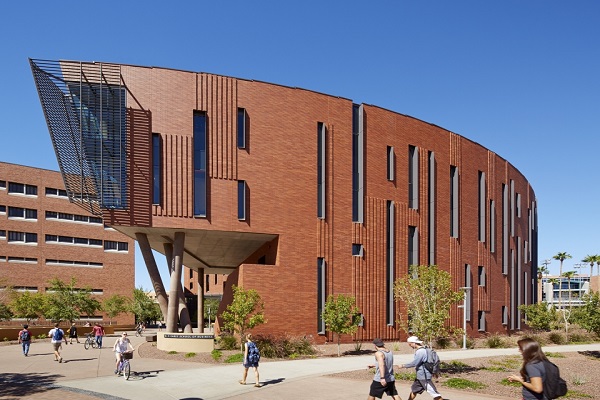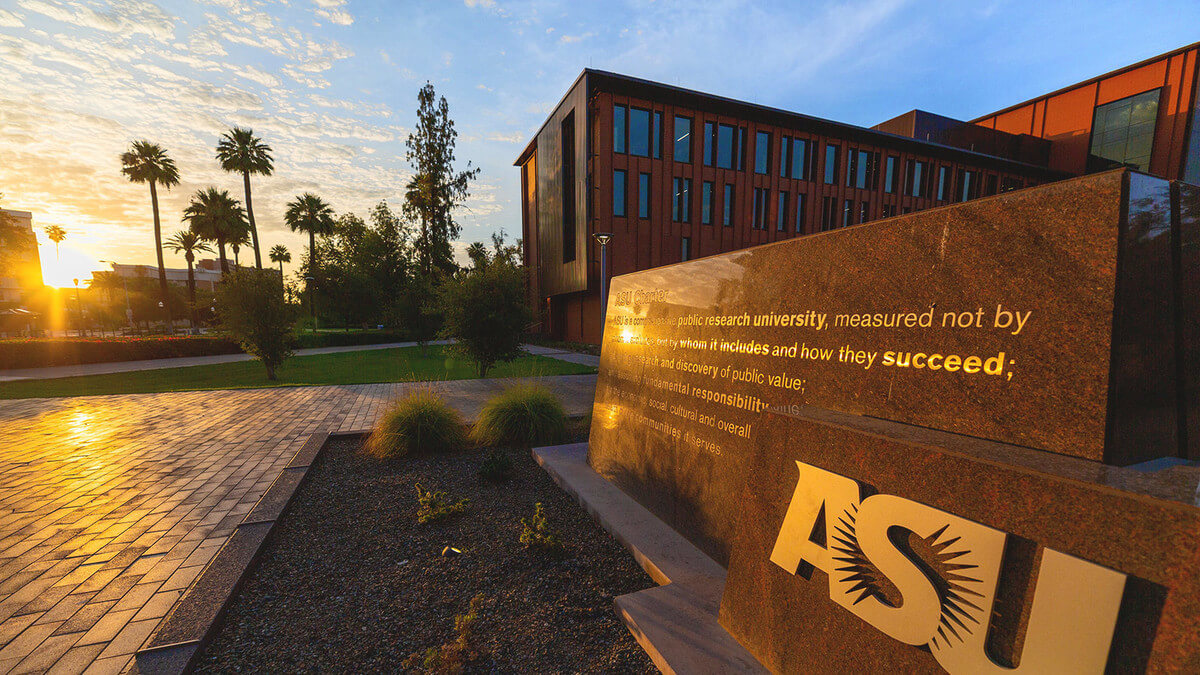Arizona State University (ASU), a public research university located in the Phoenix metropolitan area, boasts a rich history and a vibrant present. Founded in 1885 as the Territorial Normal School, ASU has transformed into one of the largest public universities in the United States by enrollment.
A Legacy of Growth and Transformation
Arizona State University’s story is one of continuous development. From its humble beginnings as a teacher training institution, the university has expanded its academic offerings to encompass a vast array of undergraduate and graduate programs. Today, ASU offers degrees in a multitude of fields, including engineering, business, law, medicine, and the humanities.
This growth is reflected in ASU’s multiple campuses spread across the Phoenix area. The Tempe campus, the university’s original location, serves as the bustling heart of ASU. Additional campuses cater to the diverse needs of the student body, offering specialized programs and a dynamic learning environment.
A Hub for Research and Innovation
Arizona State University‘s commitment to research excellence is undeniable. The university is classified as a “very high research activity” institution by the Carnegie Classification of Institutions of Higher Education. This designation reflects ASU’s robust research enterprise, which tackles critical challenges across various disciplines.
From breakthroughs in solar energy solutions to advancements in healthcare technologies, ASU’s researchers are at the forefront of innovation. The university’s research endeavors not only push the boundaries of knowledge but also contribute to positive societal change.
Sun Devil Spirit: A Culture of Excellence
Arizona State University fosters a strong sense of community, with a mascot – the Sun Devil – that ignites school spirit. The university offers a multitude of extracurricular activities, allowing students to explore their interests and develop valuable skills outside the classroom. From athletic events at Sun Devil Stadium to vibrant cultural events, ASU provides a well-rounded university experience.
Looking Forward: A Bright Future for ASU
As Arizona State University ventures into the future, it remains dedicated to its core principles of academic excellence, research prowess, and community engagement. The university is continuously striving to improve accessibility and affordability, making a quality education attainable for a wider range of students.
Arizona State University’s commitment to sustainability is another hallmark. The university implements green initiatives across its campuses, fostering a culture of environmental responsibility. With its focus on innovation and social impact, Arizona State University is poised to remain a leader in public higher education for years to come.

Is Arizona State University a good university?
Yes, Arizona State University is generally considered a good university. Here’s a breakdown of its strengths:
- Strong academic reputation: ASU consistently ranks high among public universities, with global recognition for its programs.
- Innovation and research: The university is a leader in research activities, tackling important issues and fostering a culture of discovery.
- Diverse academic offerings: With a vast array of undergraduate and graduate programs, ASU caters to a wide range of interests.
- Large and vibrant campus: The university offers a dynamic learning environment with a strong sense of community.
- Focus on affordability and accessibility: ASU strives to make quality education attainable for a wider range of students.
However, like any university, ASU might not be the perfect fit for everyone. Here are some things to consider:
- Large student body: ASU has a very large student population, which may not suit everyone’s preference.
- Acceptance rate: With a high acceptance rate, classes might have a larger number of students compared to some other universities.
To get a more nuanced perspective, you can explore resources like student reviews or forums about ASU. Ultimately, the best way to determine if ASU is a good fit for you is to research its specific programs, campus life, and financial aid options.
What GPA do you need to attend Arizona State University?
Arizona State University has multiple admission requirements, and the GPA requirement isn’t a single fixed number. Here’s the breakdown:
- Minimum GPA: To be admitted based solely on GPA, you’ll need a minimum of a 3.00 GPA in competency courses (on a 4.0 scale)
- Alternative options: If your GPA falls below 3.00, you can still qualify for admission through other means, such as:
- Ranking in the top 25% of your high school graduating class.
- Achieving a qualifying score on the ACT or SAT exams.
For specific details and score requirements, it’s best to refer to ASU’s official admission website (https://admission.asu.edu/apply/first-year/admission).
How is ASU for Indians?
Arizona State University (ASU) has a lot to offer Indian students, making it a popular choice for many. Here’s a breakdown of the pros and cons to consider:
Pros:
- Large Indian Student Population: ASU boasts the highest number of Indian students enrolled among public universities in the US. This translates to a familiar cultural environment and a strong support network through the Indian Alumni Chapter (https://alumni.asu.edu/chapters/indian-alumni-chapter).
- Academic Programs: ASU offers a wide range of programs in fields popular with Indian students, such as Engineering, Computer Science, Business, and STEM fields in general (https://goglobal.asu.edu/students/international).
- Pathway Programs: ASU collaborates with Indian universities to offer accelerated programs allowing Indian students to complete a Master’s degree in a shorter timeframe (https://goglobal.asu.edu/students/international).
- Financial Aid: While financial aid for international students might be limited, ASU offers scholarships and assistantships you can explore during the application process.
Cons:
- Large Class Sizes: Due to the high number of students, some classes at ASU might have larger class sizes compared to other universities.
- Reduced “Abroad” Feel: With a large Indian student population, you might not experience the same level of cultural immersion compared to universities with a smaller international student body.
Additional Resources:
- India at ASU webpage: This ASU webpage provides specific information and resources for Indian students considering ASU (https://goglobal.asu.edu/students/international).
- Reddit forum: This Reddit thread by ASU students discusses the university’s Indian student population (https://www.reddit.com/r/ASU/comments/1am20xd/is_asu_safe_for_indian_students/).
Ultimately, whether ASU is a good fit for you depends on your individual priorities. Consider factors like your desired program, financial aid options, and your preferred campus environment.
Is Arizona State University expensive?
Arizona State University’s cost of attendance can vary depending on several factors, so it can be expensive for some students but affordable for others. Here’s a breakdown:
- Residence Status: In-state students generally pay significantly less than out-of-state students for tuition and fees.
- Campus Location: Costs might differ slightly depending on which ASU campus you attend.
- Financial Aid: ASU offers scholarships and financial aid opportunities that can significantly reduce the overall cost.
Here’s a general cost range to give you an idea:
- In-State Students: For in-state students living on campus, the total cost of attendance (including tuition, fees, housing, and meals) can range from $30,000 to $45,000 per year.
- Out-of-State Students: Out-of-state students face a steeper cost, with the total cost of attendance ranging from $50,000 to $70,000 per year.
Here are some resources to help you estimate your costs:
- ASU’s Tuition Estimator: This tool allows you to personalize your estimated costs based on your residency status, program of study, and campus location (https://tuition.asu.edu/cost/tuition-estimator).
- ASU’s Financial Aid Website: This website provides information about scholarships, grants, and other financial aid options to help make ASU more affordable (https://tuition.asu.edu/financial-aid).
By considering these factors and utilizing the resources provided, you can get a better understanding of the financial commitment required to attend ASU.
